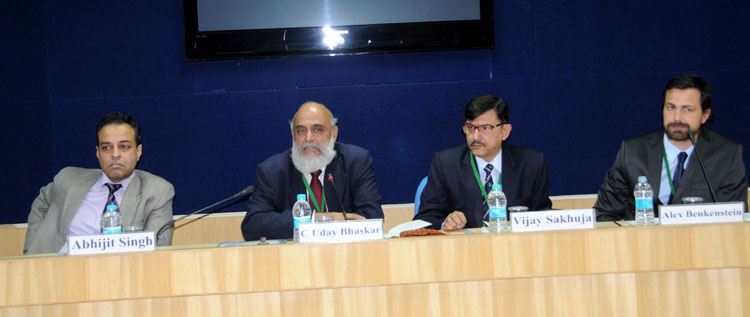You are here
Maritime Security Challenges

The third session of the dialogue deliberated on Maritime Security Challenges and enhancing India-Africa cooperation to deal with these common challenges. India’s role in addressing the Somalia crisis during the Clinton administration was a learning curve for India in terms of the way Somali crisis unfolded. Technological constraints in engaging with African countries during that time was also brought out. Over the years, however, there has been such episodic focus in terms of Indian Navy’s engagement with African countries.
The increasing importance of India-Africa maritime security cooperation to confront the challenges of the 21st century was emphasised during the session. It was also highlighted that the increasing importance of the East Africa as an emerging resource rich area where the amount of exploitation of natural resources has been taking place at rapid pace since last few years. On piracy, he said, though the incidents of piracy have decreased in recent years, but these incidents have reached wider geographic area and also the sophistication of the attacks. This challenge will prevail so long as there is continued instability, lack of governance in the Horn of Africa, and that tied with weak states and their inability to provide security. Economic and political marginalisation in addition to inequitable development further creates fertile grounds for radicalisation of political positions. There is a necessity of expanding cooperation between India and Africa to address the emerging threats such as piracy, mitigating energy shortfall etc. and for capacity building and infrastructure development for better managing the natural resources.
It was emphasised that the lack of governance and ineffective security apparatus in the coastal areas has resulted in favourable conditions for the growth of terrorism, piracy, drug trafficking, gun running, and other illegal activities.
India always aware of maritime terrorism but it is now confronting this threat from the sea. However, he held that after 26/11 Mumbai terror attacks, India has undertaken a major overhaul of its costal security apparatus which involved restructuring of security organisations, infrastructure build-up to bridge the gap in maritime surveillance and reconnaissance, training of personnel, technological improvements and expanding the number of stakeholders. He felt that the challenges to India’s maritime security can be best dealt with by increasing its presence further into the seas.
Maritime security can be best achieved by spreading maritime awareness, improving the surveillance system, using modern maritime technology, increasing institutional cooperation and holding regular strategic dialogues between maritime nations. Fishermen are in fact right position to provide best maritime security. They need to be trained and cultivated in this regard. In recent times India has been making efforts in capacity building and sharing best practices with regional coastline countries through a number of activities such as bilateral naval exercises, regular ship visits, training, transfer of naval hardware, and sharing of intelligence.
At the multilateral level, India has adopted a proactive approach and advocated greater emphasis on cooperative maritime security. But the inward-looking approaches of the regional institutional mechanisms are the main obstacles to capacity building efforts. As a result, cooperation and capacity building efforts are in silos. A fully seamless and integrated approach is necessary to bridge the gap and effectively deal with the coastline challenges.
India and Africa have made various efforts in improving their maritime cooperation in recent years. As India’s economic engagement with the African countries is growing, it has sought to gradually expand its sphere of influence in the Western Indian Ocean. Consequently, Indian Navy’s outreach on its Western flank has resulted in noteworthy maritime endeavours. However, progress in developing a coherent and viable plan of action has been very slow. Both Africa and India have found it difficult to grow of their regional maritime mind-set and made halting headway in developing an effective maritime collaboration.
It was suggested that India should start by agreeing to cooperate on basic maritime security issues such as improving maritime domain awareness, building local policing ability, and training of personnel, it will eventually need to assist in the evolution of an African maritime economy and a comprehensive strategy for maritime development. As Africa looks to enlist the support of regional and international partners, he stressed the necessity of increasing India’s role in helping the African nations to integrate their existing institutions and projects into a self-sustaining maritime system. It was believed that that through a collaborative arrangement, India could assist in the creation of an African maritime sector that generates the security, confidence, and efficiency necessary to spark the investment, trade, and jobs vital for the continent’s prosperity.
An intense and constructive deliberation followed the presentations. The discussions laid stress on the critical importance of the Navy in countering the emerging maritime security challenges of the 21st century. In this regard, the participants argued for increasing the presence of Navy in the coastline areas, holding regular naval exercises, training, technological and intelligence sharing, and conducting regular strategic dialogues to address the immediate as well as long term security challenges.
Report prepared by Dr. Saroj Bishoyi, Researcher, IDSA.
